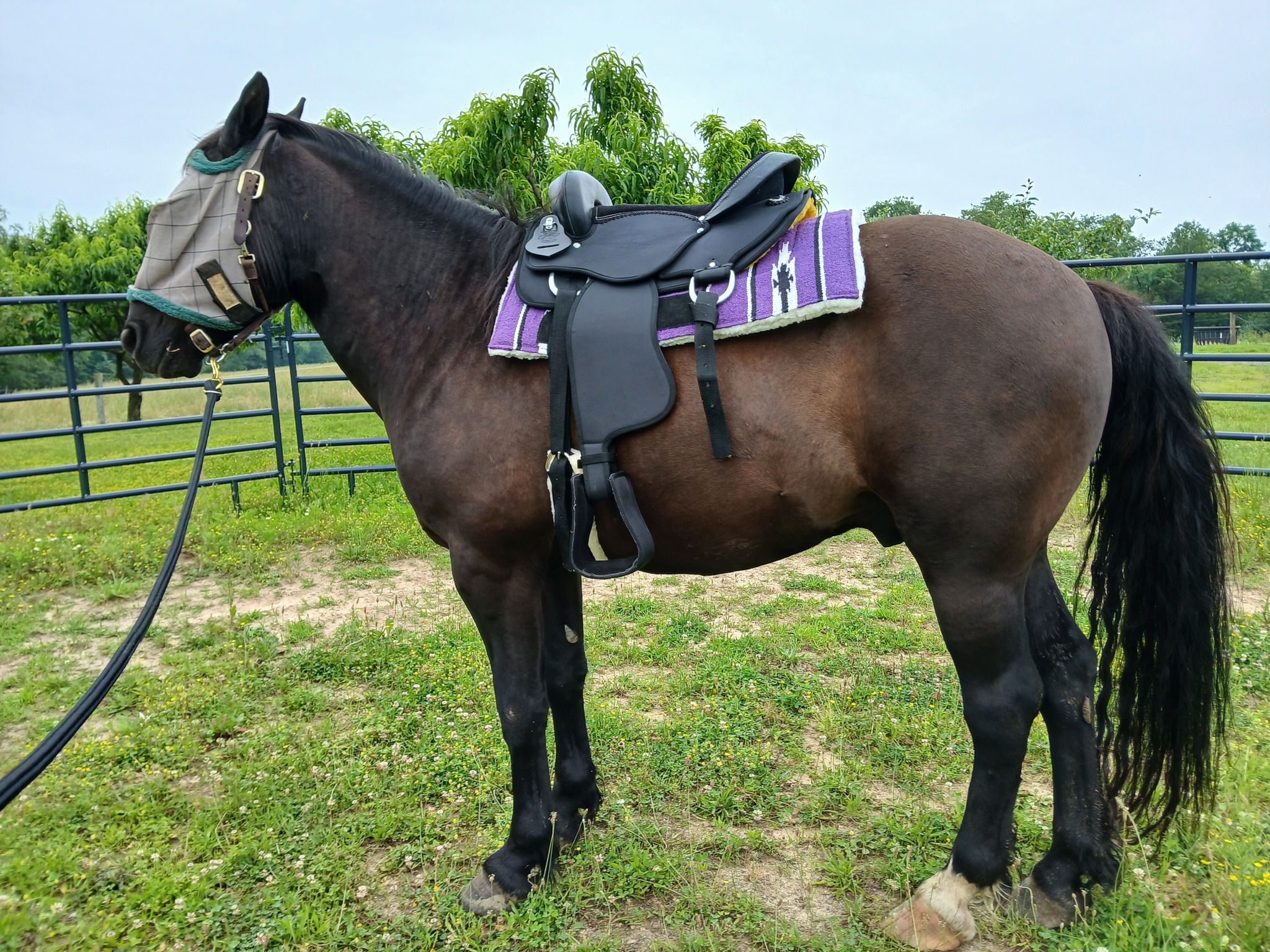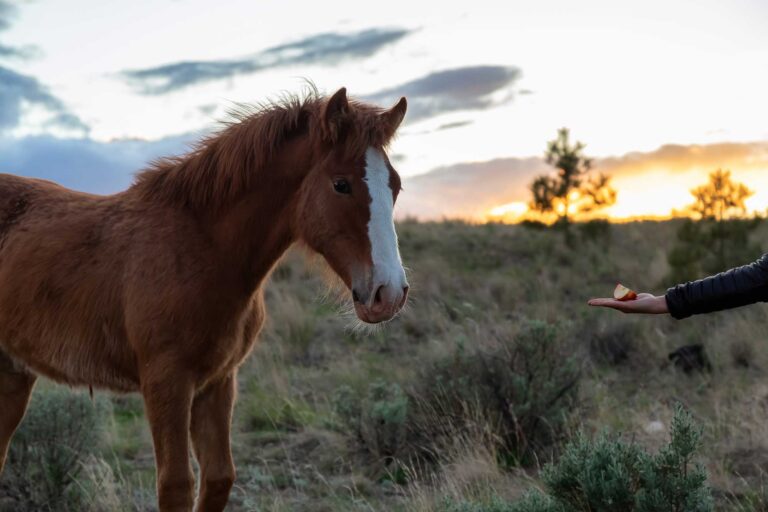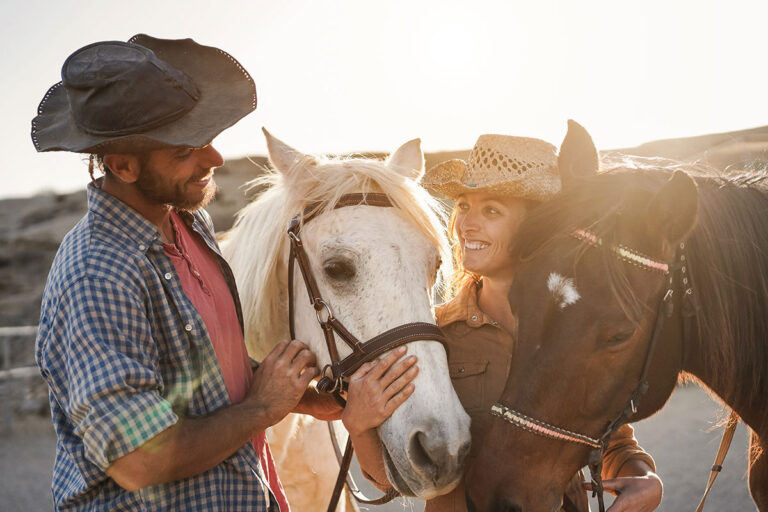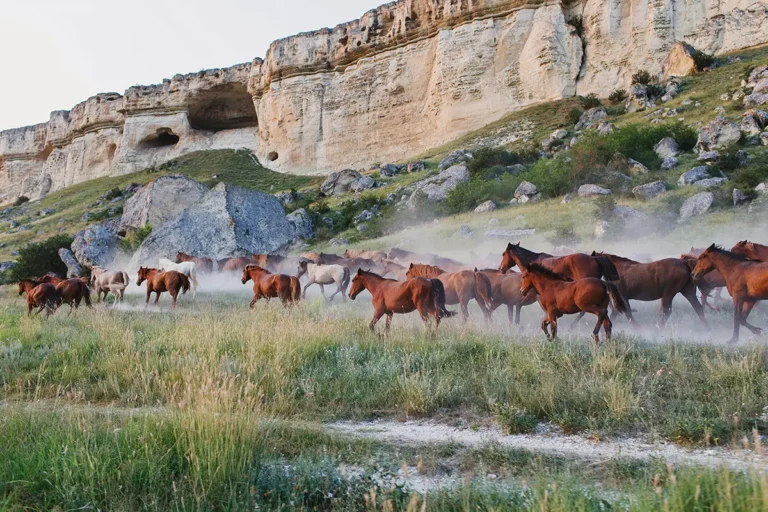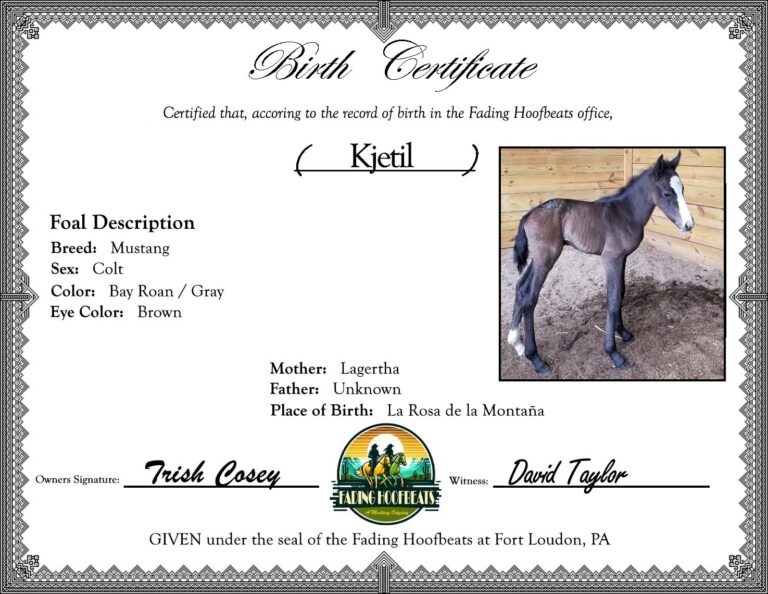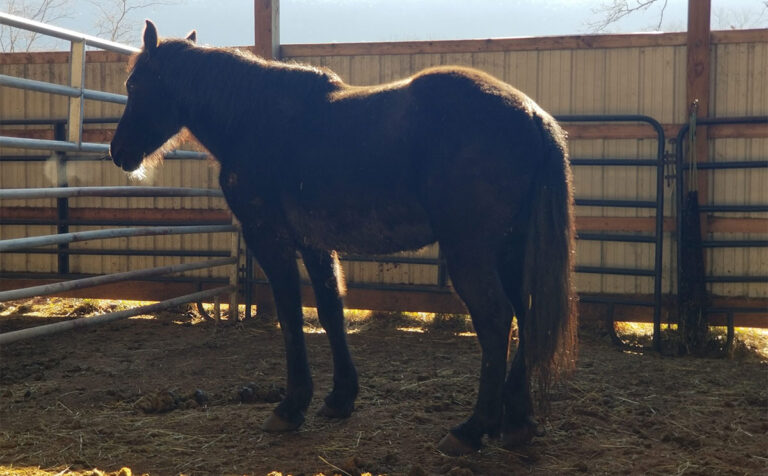Spooky Horses: A Trail Journal on Lookouts, Wind, and Borrowed Calm
From the Fading Hoofbeats tack room—where a mustang named Floki reminds me that vigilance is a love language.
Author’s Note
Floki is wild‑born from the McGavin Peak HMA in northern California—a natural watcher. Lagertha, my thoughtful Devil’s Garden mare, is his herd‑mate and steadying presence. Much of what follows was learned walking fence lines, standing under junipers, and letting wind write the lesson plan.
I had a dream once—a nightmare that turned itself inside out. I was riding a spooky horse using only a halter and lead rope when he propped and went stone‑still, the kind of still that hums. I slid off, walked a few steps past his shoulder, and tried to see what he saw. Nothing obvious—just the brush breathing. I glanced back at him, took a couple more steps toward the unknown, and finally caught it: a squirrel, rustling like a mountain lion in a dry‑leaf suit. I sighed, relaxed, returned to him and touched his shoulder, murmured something soft, and he relaxed. He edged past the noisy squirrel, and we carried on.
Years later that dream became a tool I reach for without thinking. When I adopted two mustangs and met my watcher, Floki, the dream handed me a map.
The Day My Focus Spooked My Horse
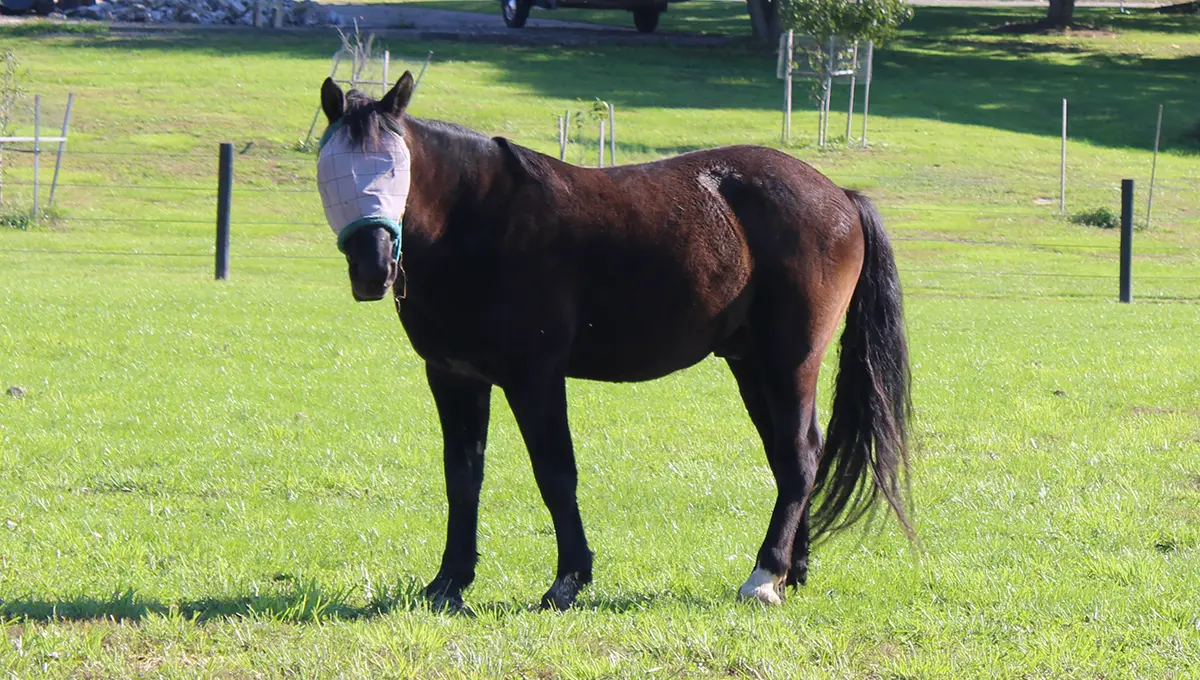
When your horse alerts:
• Join the look (10 seconds to save you from a fight for control with a frightened horse).
• Exhale audibly; soften shoulders/hips. Horses that are frightened don’t stand hip-shot; if they see you stand that way, they equate that with safety.
• Light touch at the neck/shoulder.
• Tiny ask (one step/arc/breath).
• Words: “I see it.” “Easy.” “With me.” “Good eyes.”
• Quit on a win; confidence compounds, and confidence compounded daily becomes trust in the bank.
Windy‑day checklist:
• Lower the agenda; make it about confidence.
• Start farther away from that which spooks; work in.
• Keep your breathing obvious, but natural. Don’t hold your breath, but don’t breathe hard, either.
• Allow the look; then sigh, touch, pause, and re‑ask.
• Reward the check‑in.
Progress markers:
• Shorter alerts.
• Faster recovery.
• First move is toward you.
• Work becomes rideable sooner.
We’d just moved to a new farm and I took Floki out for a walk‑and‑graze, letting him sort the new smells. I was squinting at a distant landmark, trying to make out what it was, when his head snapped up. He looked at me first, then hard at the ridge I’d been staring at. To a horse, human concentration = concern. My gaze had become a pointing finger.
I remembered the dream. I exhaled on purpose, let my shoulders drop a couple inches, and laid my hand where his neck meets his shoulder. He breathed with me, checked the direction of my attention again, and dropped his head to graze. The lesson was plain: the watcher doesn’t want you to be fearless; he wants you to be readable, and most of all, reliable.
Breakfast With a Jackhammer
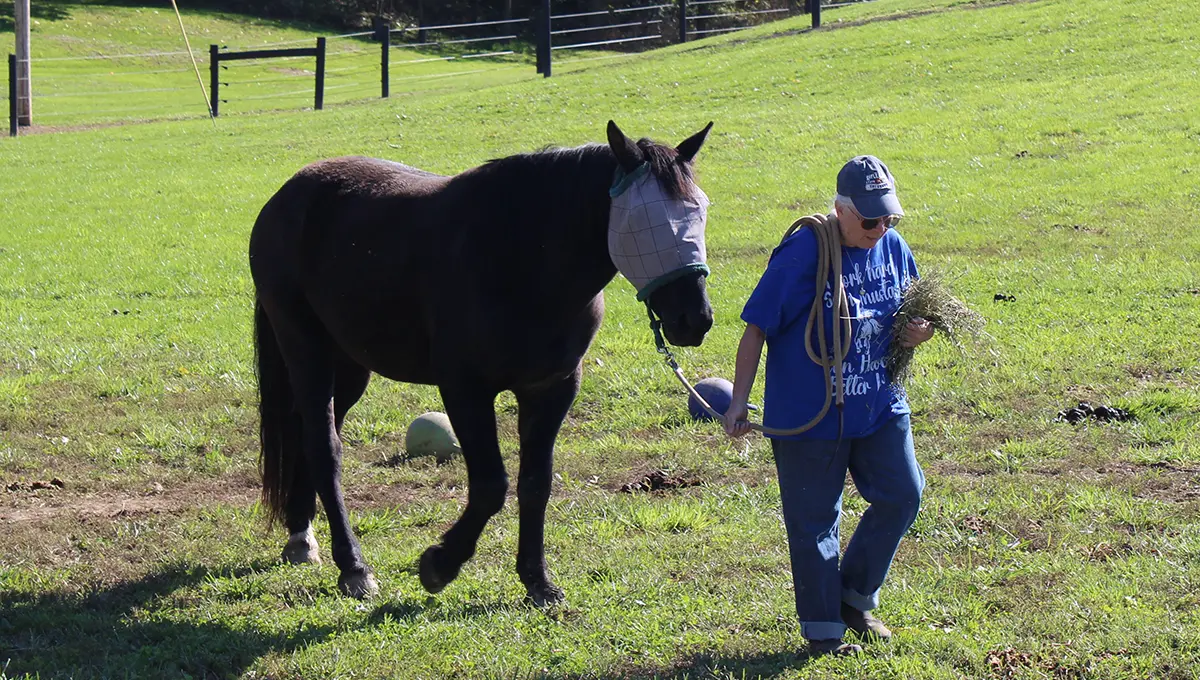
Another morning, Floki didn’t come in for breakfast—a red flag, because like most horses he is ruled by his stomach. I tossed Lagertha her hay and headed out. Under the junipers he stood, statue‑still, head up, staring across the pasture. I called; nothing. So I stood beside him and listened with him. At first: only the soft breeze. Then, faint and foreign in our quiet life—a jackhammer, far off.
I chuckled the way I’ve taught myself to—a soft, low sound that feels like a nicker—and I let that sound ride on a long sigh as my hand found his shoulder.
“It’s okay, Floki. Want some alfalfa?” Both are phrases he knows. He turned, gave me his trademark talkative nicker, and we walked in together. Not because the world got quieter, but because our conversation did.
A Stranger at the Gate
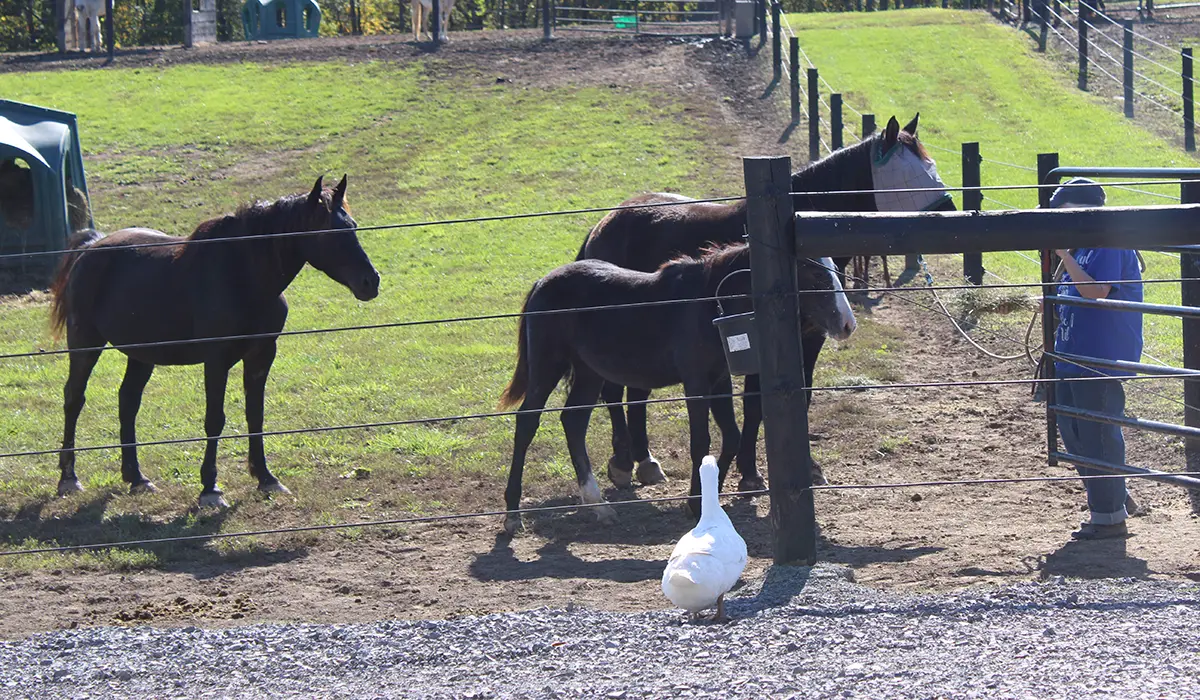
Another day a trainer came to work with Lagertha. As I led Floki up from the back run‑in, she stepped into the pasture. He froze: ears pricked, body taut, every wire hot. A wild‑born mustang carries the plain math of survival—humans in the open range usually meant danger. That doesn’t vanish with a halter and a few gentle months. Unless there’s steady social traffic (a luxury we don’t always have), strangers stay filed under unknown/dangerous.
Floki is a watcher by birthright. In a herd, watchers pay for everyone else’s grazing time with vigilance. But this time, instead of bracing or bolting, he touched his nose to my cheek, then looked back at the stranger, then to me again. He wasn’t cadging cookies. He was asking, Is this safe? Have you got my back?
I always tell him, “I gotchyer back, Jack.” Time to mean it. I wrapped an arm softly along his jaw, stroked his cheek, and let my breath slow and soften. He held, then I felt the change: the exhale, the shoulder that unlocked, the poll that dropped a notch. We walked forward together.
That’s the whole creed, really: the lookout keeps watch; the human keeps showing that they see too.
Wind, Watchers, and Why It’s Hard
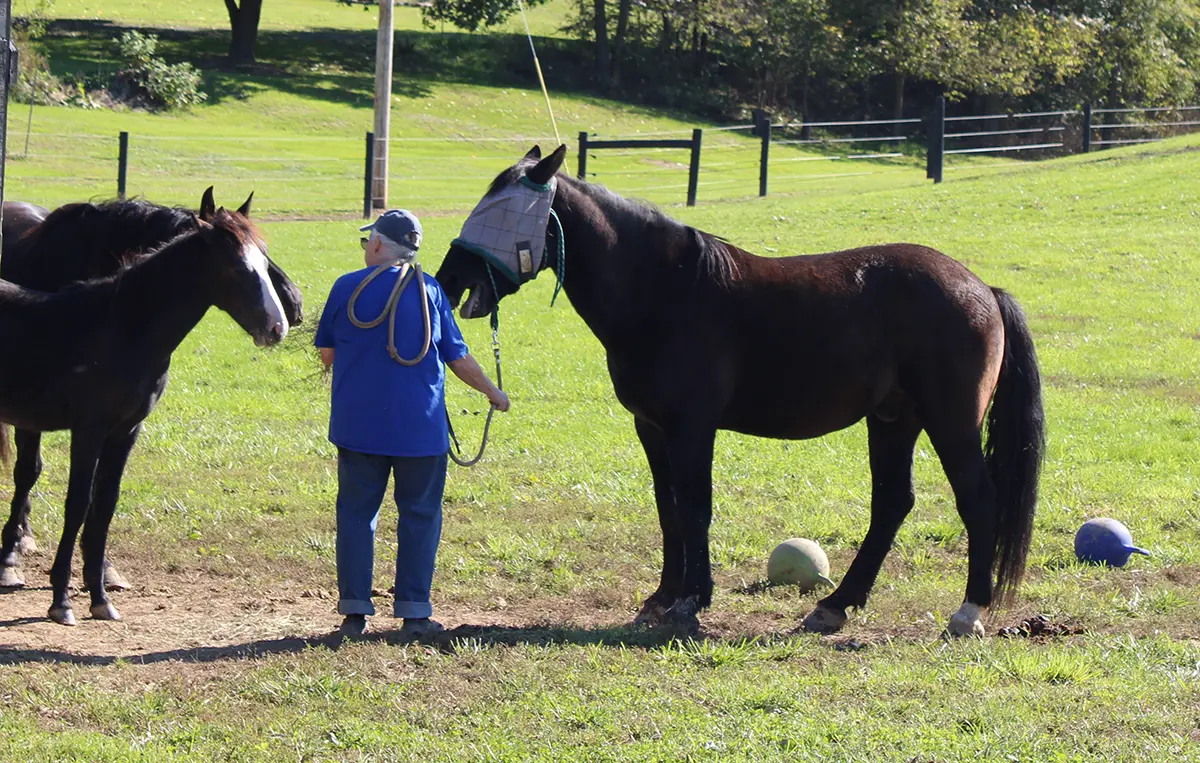
Wind is nature’s static. It smears sound, dilutes scent, and sets the whole world moving—grasses, branches, flags, tarps. For a sentinel brain, that’s a thousand possible threats at once. On windy days, I lower my agenda. We make the session about confidence, not mileage. If he needs to stop and look, we stop and look. If I don’t see what he sees, I still see that he sees.
Because that’s the piece humans skip: we tell a horse “There’s nothing there,” but to him there is. Dismissing the alert is like ignoring a smoke alarm because you don’t see flames yet.
Field Notes (What I Actually Do When He Alerts)
- Join the look: Ten seconds, minimum. I orient my eyes where his are, and concentrate. That alone says, Message received.
- Borrowed calm: Exhale audibly. Drop my shoulders. Soften my hips if I’m mounted.
- Light touch: Hand on the neck or shoulder. Not rubbing—just gentle but solid contact. In the wild, horses reassure each other like this. Take a page from their book; they’ll be able to read it.
- Wait for the response: Rushing them before they have a chance to decide that you’ve got their back isn’t going to do anybody any good, and could cause a setback.
- Tiny ask: One step, a small give, a counted breath. Reward the try.
- Words we keep: “It’s okay.” “Easy, now.” “I gotcher back, Jack.” Words that will come to mean something tangible to both of you before you realize it. Praise the role: “Good job, buddy.”
On quiet days we practice the sequence so it’s there when the wind comes up. The cue isn’t asking for obedience; it’s permission to relax. If you don’t have something that gets your horse’s attention so that you can lay the groundwork on the calm days, manufacture it. Be the one who goes on high alert for a moment—when the horse notices, relax, touch his shoulder the way one wild horse would do to another, and tell him it’s okay.
What Progress Looks Like for a Watcher
He’ll likely always be the first to notice the flapping flag. But the arc shortens: alert → check in → exhale → back to grazing (or work). The trust isn’t that I remove every fear. The trust is that I notice it, too. This is part of what Warwick Schiller means when he says, “They know when you know, and they know when you don’t.”
And when he turns his nose to my cheek, I remember the dream that taught me to walk a few steps toward the unknown, to sigh like a horse, and to lay a steady hand where neck meets shoulder. That’s our whole contract: he watches the world; I watch him.
“The trail isn’t measured in miles, but in the trust we build along the way.”

